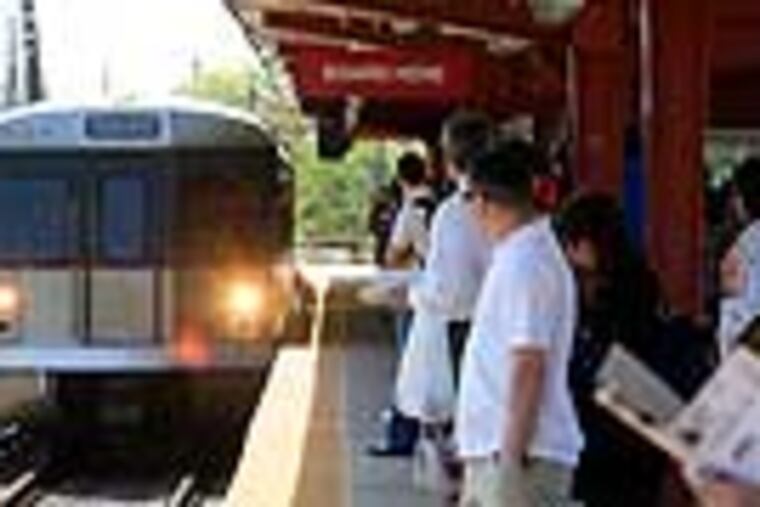PATCO enhancing electronic fare system
Higher tech is coming to PATCO. Starting next week, passengers on the commuter rail line will be able to manage their electronic fare cards on the Internet, and by September, they will be able to use a credit card, instead of the PATCO-only card, to pay their fares.

Higher tech is coming to PATCO.
Starting next week, passengers on the commuter rail line will be able to manage their electronic fare cards on the Internet, and by September, they will be able to use a credit card, instead of the PATCO-only card, to pay their fares.
About 70 percent of PATCO riders use the agency's Freedom card, an electronic "smart" card introduced in 2007. On Monday, PATCO will launch an online system that will permit users to add value to the cards and view their transaction histories. The system will be available at www.patcofreedomcard.org
Later this month, PATCO will begin tests for a one-year pilot program for credit-card fare payment. That will make PATCO among the first transit agencies in the nation to have such capabilities across its system.
"A lot of eyes will be on our operation," Cheryl Spicer, assistant general manager of PATCO, said Wednesday at a meeting of the board of PATCO's parent, the Delaware River Port Authority.
Cubic Transportation Systems Inc. of San Diego, which installed the Freedom card system, is upgrading PATCO's fare gates to read bank cards that have an embedded electronic chip.
The pilot program will allow Cubic to test an "open-payment" system designed to free customers from the need to buy a transit card. Instead, they could pay fares with bank-issued credit, debit, or prepaid cards. Transit systems around the country, including SEPTA and NJ Transit, are moving toward open-payment systems.
The demonstration project on PATCO's 14-mile line between Lindenwold and Center City will give Cubic a working system on which to test its technology.
Cubic will pay the cost of upgrading PATCO's gates and computer operating system, as well as the transaction fees charged by cardholders' banks. The upgrades are worth about $680,000 to PATCO.
In the first six months of the pilot, starting in September, Bancorp Inc. of Wilmington will market reloadable prepaid PATCO Visa cards through area merchants. They could be used for travel on PATCO or for purchases at any merchant that accepts Visa.
During the second six months, any "contactless" bank cards with an electronic chip also would be accepted by the PATCO readers. Contactless cards are marked with an icon that resembles a radio wave.
After a year, the pilot is scheduled to end, and the Visa-reading capability of the gates would be disabled.
The program could be continued, but PATCO would have to pay transaction fees for each contactless payment.
Those fees could be prohibitive for the relatively small agency. But if neighboring transit authorities also adopted open-payment systems, PATCO might be able to negotiate lower fees.
"We will not be prepared to move forward until open payment is accepted by larger transit systems, like SEPTA," Spicer said Wednesday.
In other business, the DRPA board put off plans to hire a consultant to investigate whether the agency's salaries and benefits are too high.
Some board members were concerned about the $225,000 price of the proposed compensation study, said chief executive officer John Matheussen. So a proposal to hire the Hay Group of Philadelphia to evaluate DRPA's employee compensation was tabled.
The proposal to conduct such a study was prompted by a push last year to change DRPA practices and governance amid extensive criticism of executive salaries and perquisites. A management audit issued in August urged the DRPA to overhaul its pay and performance-review systems.